If there’s one thing history teaches us, it is that art forms that appeal to one generation will surely appeal to generations that follow. There should be no need for me to explain to my younger colleagues just who Copperpenny, Helix, and Major Hoople’s Boarding House were. No doubt all are as well known today as they were fifty years ago. (Although I’ll provide the links anyway, because I am just that considerate.)
SF authors of a certain vintage embraced this exuberant confidence in the long-term viability of their favourite musical genres. Take these five works, for example.
City Come A-Walkin’ by John Shirley (1980)
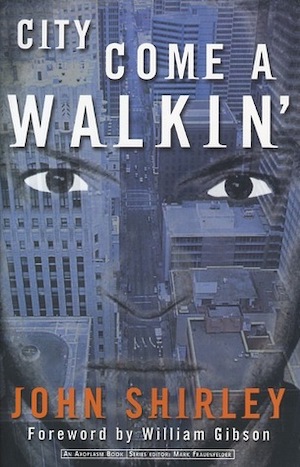
Stuart Cole’s nightclub, Club Anesthesia, is a stalwart redoubt for San Francisco’s chaotic counterculture, a refuge for rockers and other eccentrics who do not fit into conventional society. Keeping the club open is an ongoing struggle.
Cole worries about predatory mobsters and crooked city government. He does not worry about a living manifestation of the City…until the day that the City’s man-shaped avatar visits him. If Cole were prudent, he might wonder if the avatar had Stu’s best interests in mind when it proposes a partnership on a few cunning plans…but then, a sensible person wouldn’t be running Club Anesthesia.
The Armageddon Rag by George R. R. Martin (1983)
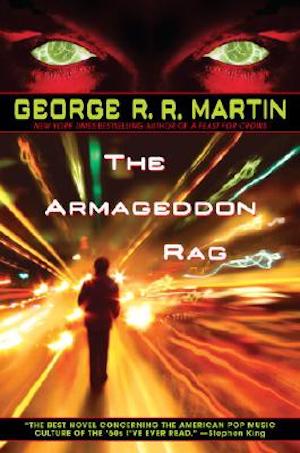
Disillusioned counterculture novelist Sandy Blair’s career has foundered. He finds a new role as amateur sleuth when his friend, rock promoter Jamie Lynch, is murdered.
The murder was a ritual murder. It may have been bad news for Jamie Lynch, but it’s good news for legendary rock group the Nazgûl. They broke up a decade ago. The day on which Lynch was murdered? It’s the tenth anniversary of the breakup. Post-murder, the band announce a reunion tour. It’s almost as though the whole affair was planned to revive the Nazgûl.
Blair finds that Lynch’s killer had a much darker goal in mind.
Wrack & Roll by Bradley Denton (1986)
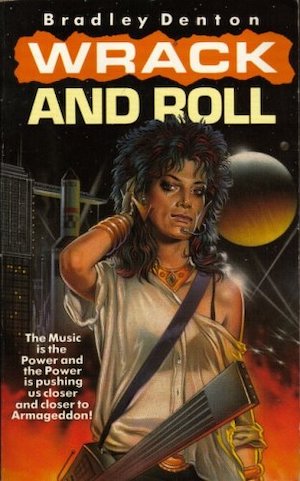
In a world where World War II played out quite differently, post-war Americans celebrated imported German know-how and American engineering by dispatching rock superstar Bitch Alice to the Moon. Marooned by a fuel-pump failure, doomed Bitch Alice’s last words to her fans were “trash Dallas.” Fans listened, America’s space centre went up in flames and Anglo-Chinese dominance of space was assured.
A generation later, President Fitzgerald considers the superiority of the Anglo-Chinese alliance an affront. He has a grand plan to put America back on top again. Key to his bold vision is Bitch Alice’s illegitimate orphan, Lieza “The Bastard Child” Galilei. Lieza might be reluctant to do what he wants, but surely the president will have his way. After all, what can one puny musician do in the face of presidential might?
Little Heroes by Norman Spinrad (1987)
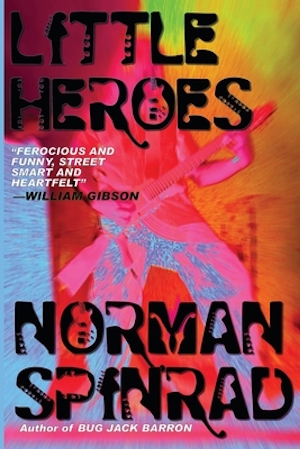
Muzik Inc has plans for aging rockstar Glorianna O’Toole. They’ll use her as the model for a computer-generated, algorithmically tweaked synthetic superstar, a robot. Needless to say, she’s not going to get any royalties—just a one-off fee.
Gloriana is sincerely devoted to rock and roll. She is sure that Muzik Inc’s robotic creation would be a soulless abomination. But Muzik is offering a Faustian sweetener: modern technology can restore the Crazy Old Lady of Rock and Roll to her former glory (vicariously). A tempting offer, but is it tempting enough to buy Glorianna’s soul?
War for the Oaks by Emma Bull (1987)
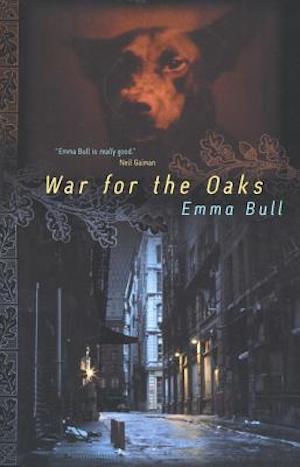
Minneapolis rock singer Eddi McCandry would no doubt say she is dealing with more than enough trauma. She has left her band and broken up with her boyfriend. Now she is being stalked by a mysterious figure. This was nowhere on her to-do list! However, fate has a way of handing people unexpected and unwelcome challenges.
Amongst Minneapolis’ new residents: the Fair Folk, who have brought their exuberant love of factions and mano-a-mano politics with them. Minneapolis will be the next battleground between the Seelie and Unseelie Courts; Eddi will be their most recent human draftee.
***
There are a many rock-‘n-roll-adjacent works I could have mentioned. No doubt some of your favourites have been overlooked. Comments are, as ever, below.
In the words of fanfiction author Musty181, prolific book reviewer and perennial Darwin Award nominee James Davis Nicoll “looks like a default mii with glasses.” His work has appeared in Publishers Weekly and Romantic Times as well as on his own websites, James Nicoll Reviews (where he is assisted by editor Karen Lofstrom and web person Adrienne L. Travis) and the 2021 and 2022 Aurora Award finalist Young People Read Old SFF (where he is assisted by web person Adrienne L. Travis). He is a four-time finalist for the Best Fan Writer Hugo Award, and is surprisingly flammable.










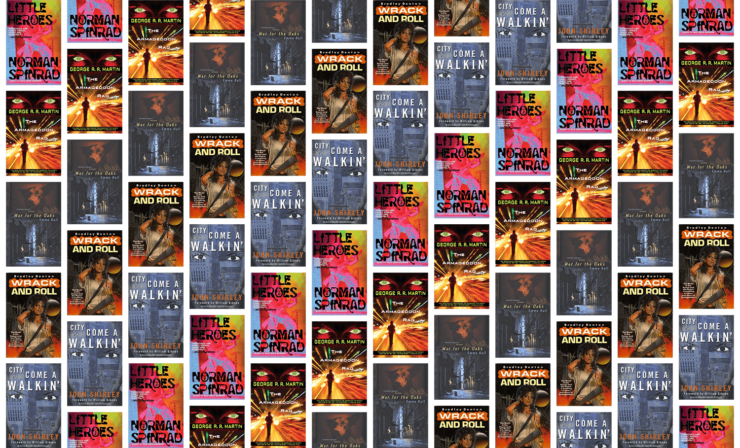
If one is speaking of rock ‘n roll and mentions War For The Oaks, someone will always then pop up to mention the other Elves With Guitars book from the late 80s/early 90s, Gossamer Axe, by the apparently-no-longer-publishing Gael Baudino. I am willing to be that person. It is charmingly batshit, but also quite good. (Involves a heavy metal duel to save the protagonist’s queer partner.)
Hm! Baudino self-published something in 2017. Good to know.
A more recent example would be Grady Hendrix’s We Sold Our Souls, although it’s definitely more horror than anything else.
So, part of the alt-hist in Wrack and Roll is that America’s space center is Dallas instead of Houston? Just checking.
And how you managed to make this list and leave off Lewis Shiner’s Glimpses is beyond me.
I’ve got to mention Paula Guran’s great anthology of rock and roll SFF, Rock On, here.
https://www.prime-books.com/shop/trade-paperbacks/rock-on-the-greatest-science-fiction-fantasy-hits-edited-paula-guran/
With some of my favorite stories:
John Shirley’s Freezone, part of the A Song Called Youth trilogy.
Al Reynold’s At Budokan, about Derek, a real rock and roll dinosaur.
https://www.lightspeedmagazine.com/fiction/at-budokan/
Elizabeth Bear’s Hobgoblin Blues, with a truly sound splitting ending.
Michael Swanwick’s The Feast of Saint Janis
Howard Waldrop’s Flying Saucer Rock and Roll
and many many other good stories.
Even the cover is cool:
Armageddon Rag is either horror or horror-adjacent.
Not prose but the film Still Crazy is almost a ghost story, or so it appears at one point from the perspective of the character who is the band’s least reliable narrator.
I’ve always liked _Fool’s Run_ by Patricia McKillip.
I’ve never read Lewis Shiner’s Glimpses. I somehow missed it, although I do have Frontera and Deserted Cities of the Heart.
Back when you could get comix in spinner racks at the drugstore, I stumbled over a hallucinatory yet amazing graphic novelization of Rock & Rule. In this movie, humans blew it up, damn them, and the world is populated by anthropomorphic animals who have copied human culture from the heyday of guitar rock. The plot revolves around an ageing superstar looking for a way to destroy the world so nobody will ever surpass his glory. It’s a trip. And I’ve never actually seen the film.
Matching the title of this column if not so much the theme, Spellsinger by Alan Dean Foster. I have not read it in many (many) years, but I remember the first one as a fun, frothy story of a young aspiring rock and roller transported to a mystical land with anthropomorphic creatures, where he can work magic with music. It might have been visited by the Suck Fairy in the intervening years, of course.
“Ready Player One” by Ernest Cline (not the movie).
The Time of the Hawklords by Michael Moorcock (with Michael Butterworth).
The complete works of Allen Steele are full of characters whose favorite music is inevitably 1970s rock, even though the stories might be set centuries in the future.
12: I am working my way through the podcast Wolf 359, which is full of pop culture references that suggest the story is set during American’s 1990 interstellar exploration program.
Gossam…oh, good, someone else mentioned it.
A much more recent find is the novella Your Favorite Band Cannot Save You by Scotto Moore. It’s as warped as the title sounds.
Enjoyed the time travel novel, The Other Times of Caroline Tangent, by Ivan D Wainewright. The gigs aren’t just classic rock but plenty in there to keep fans happy (and nostalgic)
An actual rock singer, Janis Ian, wrote some SFF short fiction in the early 2000s. In 2003 she and Mike Resnick edited an anthology called ‘Stars: Original Stories Based on the Songs of Janis Ian’, with stories from writers such as Haldeman, Kress, Bisson, Waldrop, Benford, etc.
Glad to see War for the Oaks on this list — just got finished re-reading this for our book club, and it definitely still rocks (though it’s a little dated). A streaming series — set in the 80s — would likely work very well.
City Come A-Walkin’, you should have mentioned that it’s considered by many to be the prototypical cyberpunk novel… although I find that argument a little weak given that the macguffin is essentially a self-aware ATM network.
Walter Jon Williams, Rock of Ages . There’s a visit to Holy Graceland and a prominent role for the allowed Elvis imitators. (I think there’s a portrait, The Adoration of the Elvii.) Farce/ caper novel.
I feel like Lucius Shephard must have written something that fits the bill here, but can’t think of anything off the top of my head.
SP Somtow’s Timmy Valentine books (beginning with Vampire Junction) are certainly adjacent. Timmy was turned into a vampire at age 12 and is currently the hottest thing in teeny-bopper music. Whatever the solo equivalent to a boy band is. It’s more Jungian psychology than it is rock and roll, but it sort of fits.
Also sort of fitting is Bradley Denton’s Buddy Holly is Alive and Well on Ganymede. The rock connection is right there in the title.
GRRM has said that Armageddon Rag almost wrecked his career. It did so poorly, he couldn’t get another novel contract (IIRC). That’s when he went off to Hollywood for a while to give us Ron Perlman in lion-face wooing Linda Hamilton.
In Armageddon Rag, GRRM did something very clever – a supernatural horror novel where all the explicit supernatural events are off stage. Did the evil manager make a deal with Cthulhu? The protagonist doesn’t know, and neither do we.
The “Rock and Roll Reich” series by Gwyneth Jones, five books in all starting with Bold as Love.
War for the Oaks doesn’t quite fit your topic, since the book is set in a fantasy present-day Minneapolis, relative to when the book was written. When Eddi pulls out an old David Bowie song, it’s as an audition piece, one rock musician to another.
Ha-ha. I read the title and expected it to be a pun, with the books being about things like granite and shale and gneiss. But then again, I’m at a loss to come up with any titles to list under *that* category, either.
Of (very) recent vintage, I loved Sarah Pinsker’s Song for a New Day. Beautifully captured life on the road for the cash strapped musician (with the reason she is cash strapped being a frightenly possible social extrapolation.)
The Rolling Stones by Heinlein? ;)
See also Across the Universe: Tales of Alternative Beatles, edited by Ian Strock, an anthology of short stories about alternate-world versions of the Fab Four.
Let’s not forget Terry Pratchett’s “Soul Music”, starring that well-known musician Imp Y Celyn (tr. “Bud of the Holly”) and various other possibly recognizable beings.
The entire Spellsinger series by Alan Dean Foster? No love for Jon-Tom?
@27: Everyone says he looks Elvish.
Shirley’s A Song Called Youth trilogy features a rock and roll rebel fighter
I also recall a short story called “The Ballad of Jake the Snake and the Rock and Roll Kid” by James Killus, about a future where rock and roll saved the world.
The title escapes me at the moment, but Norman Spinrad has a short story about a rock band that’s part of a CIA mind control experiment. There’s a globally broadcast concert that doesn’t end well for anyone.
ETA: Found it. It was The Big Flash, originally published in Orbit 5.
While it’s lightweight, Tad Williams’ short story “Go Ask Elric” (1994) features a loveable stoner in a mash-up of famous acid rock and Moorcock’s Elric universe; it’s a complete hoot that, fortunately, amused Moorcock too.
Jack Womack’s Elvissey, duh.
https://groveatlantic.com/book/elvissey/
“At once a biting satire and a taut, fast-paced thriller, Elvissey is the story of Isabel and John, a troubled couple who voyage from the year 2033 to a strangely altered 1954. They are on a desperate mission—to kidnap the young Elvis Presley and bring him back to the present day to serve as a ready-made cult leader. He proves, however, to be a reluctant messiah, and things do not work out quite as planned…”
Can’t get more science-fictional rock’n’roll than that.
@27: Music with Rocks In!
Anyway, one book sadly missing from both article and comments (so far) is Sacred Locomotive Flies, by the late great Richard Lupoff. “Sacred Locomotive” is the name of the band…
@19: If you’re going to include Timmy Valentine, you must, perforce, include The Vampire Lestat, in which the titular character becomes, yes, a rock star.
And we must not neglect Catherynne M. Valiente’s Space Opera, about a fractured rock band trying to save the world in a contest/concert that might as well be called Galactic Idol, or maybe The Universe Has Talent.
@22 – Disagree about (not) including War For the Oaks. Yes, it’s more or less contemporary (to the time when it was published) but it *is* fantasy. In fact, it’s cited as one of the first works in the urban fantasy subgenre and a lot of urban fantasy seems set in/near the present day.
The Borderlands/Bordertown stories edited by Terri Windling et al. have a lot of rock and roll. Much of it’s prog rock/Celtic flavored (because elves, after all). Rock and roll seems to be a tapestry against which many of the stories are set.
And we should not forget Shea and Wilson’s The Illuminatus! Trilogy, wherein an evil rock band attempts to “immamentize the eschaton” by bringing about a mass human sacrifice at a Woodstock-like music festival in Bavaria.
#5: Agreed, cool cover!
But: a seven string guitar with only six strung?! Was it just a prop picked up by the photog or is there some other meaning hidden there? Hmmm…
Bradley Denton’s Buddy Holly is Alive and Well on Ganymede
8: the amusing thing about Rock and Rule is that the villain, Mok, is based off of Mick Jagger, as sung by Lou Reed. His songs are also much more interesting than the ones the heroes perform. For example…
https://youtu.be/BJa0Zv5gHSU
Also, I seem to remember this little rock and roll sci-fi movie from 1975? Where on a dark and stormy night a young couple stumble into a house full of eccentrics? Anyone heard of it? I think the hero wanted to make a man, with long legs and a tan? I’m pretty sure it appeared and disappeared without a trace…
@11: Amazon UK currently shows “Time of the Hawklords” as “From a Concept by Michael Moorcock” et al., as he STRONGLY felt that he was being given too much credit apparently :-) Sequel “Queens of Deliria” is now on Kindle from Amazon.com “Based on an idea by Michael Moorcock” (the first book remains out of print, but available if you’re determined), and “Ledge of Darkness” front cover doesn’t mention the source of its concept.
I can’t emphasize how much Pratchett’s Soul Music (1994) fits perfectly in this theme. From the opening “This is also a story about sex and drugs and Music With Rocks In.” and all throughout the book it is a celebration of Rock and Roll, much of it in puns.
It has it all – songs, bands, greedy promoters, groupies, the life of a band on tour, and more.
What’s more it explains Rock and Roll. The Music is a primal force which created the universe and can never fade away.
@38 That makes sense, as I haven’t seen the book often listed among his works. As a lifelong Moorcock fan, I’d also be happy to learn his involvement with <i>Time of the Hawklords</i> was minimal, as even in my teens I found it unreadably bad.
@38
A stage show, and a movie, but not a book. Otherwise we could include the various adventures of Bill and Ted
You should also check out Kings of the Wyld by Nicholas Eames, it is inspired by some classic rock bands
_The Album of Doctor Moreau_, by Daryl Gregory, is a murder mystery set around a rock band of animal-people. (This is a reductive description; Gregory’s books defy easy boundaries.)
Heavily inspired by heavy metal, the Crimson Empire series by Alex Marshall. Maybe stretches the definition of “classic” rock a bit but metal as hell.
@33: It’s Eurovision IN SPAAAACE! – so much so the book contract apparently uses that literal phrase: https://whatever.scalzi.com/2018/04/12/the-big-idea-catherynne-m-valente-7/
Since no one has brought up the “Bold as Love Cycle” by Gwyneth Jones, I will; not that I’ve read it myself. It seems never to have been published in the US and the reviews make it sound like a love-it-or-hate-it proposition.
I should note there are lots of rockers in the Wild Cards universe, including the band the Fads (see Ghost Girl Takes Manhattan) and main character Drummer Boy from several books over the past decade or so.
The fanfic “Undocumented Features” has a pair of excuses for why people are rocking out in the early 25th century: First, there is the influence of a cluster of immortal college students from the early 1990s, (as well as some other long-lived people from that era¹). Second, the parts that tend to involve music regularly make references that at least imply that this just happens to be a period where rock is a thing, (so you have things that are described as “Experimental jizz-fusion digiwail with reggae, punk rock and Antarean sklunge influences”²).
The Doylist reasons are simply “that’s the kind of music the main writer likes,” and “it’s a lot easier to have them play ‘Limelight’ by Rush than to come up with an original song and musical style.”
1: Guess what happens when you run Vocaloids on the right kind of alien hardware?
2: Also described as “somebody torturing a cat underwater,” and “an
unfiltered hyperpulse signal, only not as tonal.”
Mercedes Lackey’s _Bedlam’s Bard_ series? Although since it’s been over a decade since I read any of them, I don’t recall the musical genre.
I’ve read three out of the five. IMO War for the Oaks was awesome, Little Heroes was great if you like Spinrad which I kind of do, and Wrack and Roll was . . . pretty dumb. I mean, heart in kind of a good place, but self-indulgent and ridiculously implausible.
Not SFF itself, but definitely SFF-adjacent – Iain (no “M.”) Banks’ “Espedair Street” is the story of someone who was a bass guitarist in a massively popular rock band, which fell apart after an accident involving the lead singer, some concert lighting, electric cables, and a puddle of water… he’s now rich, famous, lives as a recluse, and has no idea what to do with his life. Unlike much of Banks’ mainstream work (Complicity, anyone?) the violence level is low and I find the book to be a real hoot to read. Definitely worth checking out if you’ve read all of Banks’ SF work – though I’d put it second to “The Crow Road”.
All these books are from the ’80s, so I’m not sure why some titles are being called out for what the article is about.
I wonder if using the term “classic rock” is a mis-cue. It’s certainly not a term I heard then. What’s called “classic rock” here was just the music on the radio then (unless you had access one of the oldies station, which weren’t so common then. And which could be heard only over the air).
Haven’t read all the books on the list, but War for the Oaks and Little Heroes are absolute essentials for ’80s SFF about ’80s music.
This may be the first 5-list that I’ve read all of — and a lot of great recommendations in the comments, leaving me nothing but meta-comments. (I’d especially second (?third?) Gossamer Axe, although it may be hard to find.)
@38: the topic is SF about rock, not rock musicals that happen to be SF — which is a whole other category, with items such as Phantom of the Paradise. (I also see everything else cited is print rather than performance, but ISTM that our host has covered other media in previous 5-lists.)
@47: see @21.
@52: I’m hoping ILL can find me a copy of the Banks; the only one locally is in Russian(!).
An afterthought for completists: a younger and less human-friendly version of War for the Oaks‘s Willy Silver appears in Bull’s “A Bird That Whistles”, set in the summer of 1970. The story is more rock-adjacent and folk-rock than WftO but has the same feel of Bull’s love for the Twin Cities.
For those mentioning Moorcock’s work, I recommend that if they haven’t already they look at the band whom Moorcock once worked with, and on whom those books are (sort of) based: Hawkwind

I’d also mention the “Battle-rock” story-line in the comic series “Grimjack” by John Ostrander & Flint Henry:
There’s at least one book I have read which, while not specifically about music, takes each of it’s chapter titles from a well known song.
Although it’s shelved with the mainstream fiction, I’d make the pitch that Don DeLillo’s Great Jones Street (1973), with it’s aphasia-causing experimental drug and phildickian New Wave vibe is an SF novel.